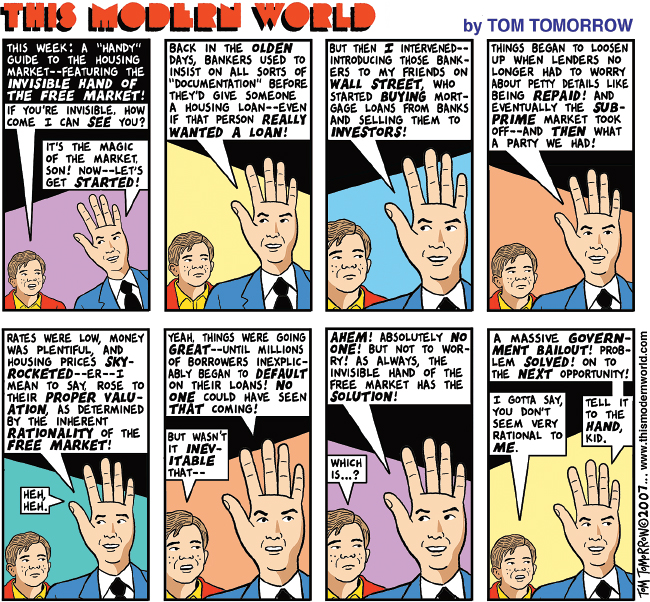This Modern World: A “Handy” Guide to the Housing Market
Tom Tomorrow
Tom Tomorrow is the pen name of political cartoonist Dan Perkins, creator of the weekly feature “This Modern World,” which appears in approximately eighty newspapers across the United States and on the Web site Salon.com. His work has appeared in publications including the New York Times, the New Yorker, Spin, Mother Jones, Esquire, the Economist, the Nation, U.S. News and World Report, and the American Prospect. In 2009, he created the cover art for the Pearl Jam album Backspacer. He is also the author of a book for children, The Very Silly Mayor (2009). He received the first place Robert F. Kennedy Award for Excellence in Journalism in 1998 and in 2003. The cartoon on the facing page features The Invisible Hand, a character based on the notion that an invisible hand guides the marketplace so that the pursuit of profit ultimately ensures the greater good. The phrase “invisible hand” derives from the following passage from Adam Smith’s highly influential book The Wealth of Nations (1776):
But it is only for the sake of profit that any man employs a capital in the support of industry; and he will always, therefore, endeavour to employ it in the support of that industry of which the produce is likely to be of the greatest value, or to exchange for the greatest quantity either of money or of other goods. . . .
As every individual, therefore, endeavours as much as he can both to employ his capital in the support of domestic industry, and so to direct that industry that its produce may be of the greatest value; every individual necessarily labours to render the annual revenue of the society as great as he can. He generally, indeed, neither intends to promote the public interest, nor knows how much he is promoting it. By preferring the support of domestic to that of foreign industry, he intends only his own security; and by directing that industry in such a manner as its produce may be of the greatest value, he intends only his own gain, and he is in this, as in many other cases, led by an invisible hand to promote an end which was no part of his intention. Nor is it always the worse for the society that it was no part of it. By pursuing his own interest he frequently promotes that of the society more effectually than when he really intends to promote it. I have never known much good done by those who affected to trade for the public good. It is an affectation, indeed, not very common among merchants, and very few words need be employed in dissuading them from it.
